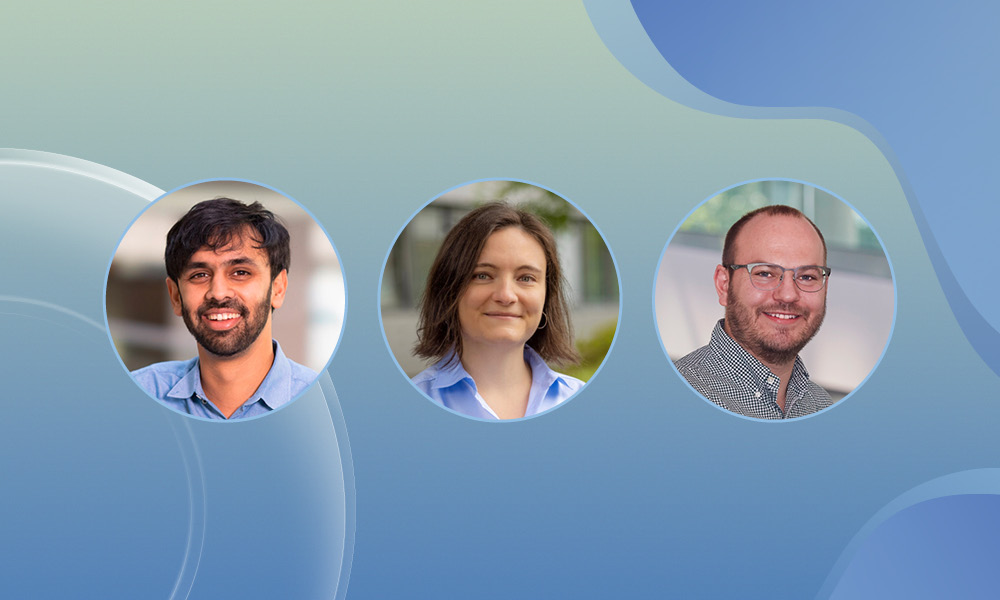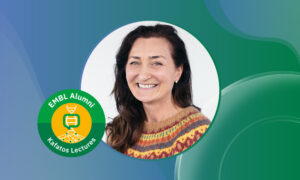
EMBL scientists receive prestigious ERC Starting Grant
Gautam Dey, Svetlana Dodonova, and Michael Zimmermann have each been awarded €1.5 million to pursue their research over the next five years

The European Research Council (ERC) is the main research funding organisation in Europe, and their Starting Grants enable young group leaders across Europe to carry out novel and exciting research. Three scientists from EMBL Heidelberg were awarded this year’s ERC Starting Grants, and will receive €1.5 million over five years to carry out research projects.
Exploring the evolution of nuclear dynamics
Gautam Dey’s research group is trying to understand the evolution of the cell’s nucleus, its organisation and architecture, and how it remodels itself throughout the cell cycle. His project that received the ERC grant will take a multi-scale approach to gain a unified understanding of the molecular mechanisms and evolutionary forces that shape the functional diversity of nuclear dynamics in eukaryotic species. To do so, the Dey group will employ comparative genomics, experimental evolution, high-resolution microscopy, and ancestral reconstruction methods.
In addition to the standard grant, Dey has been awarded an additional amount for specialised culturing and imaging equipment for atypical protist model systems, which is needed for his research. “The Starting Grant will allow us to massively scale up our investigation of nuclear remodelling and mitotic mechanisms across eukaryotes. The work will intersect with some exciting, complementary collaborations,” said Dey.
Understanding archaeal chromatin organisation
Svetlana Dodonova’s research group studies archaeal chromatin 3D organisation using cryo-electron microscopy (cryo-EM) to understand the mechanisms and evolutionary principles of genome packaging.
One of the main goals of her project that received the ERC grant is to study native chromatin organisation in situ directly inside the archaeal cells with the help of focused ion beam milling and cryo-electron tomography. This approach, together with structural and functional analysis of chromatin assembled in vitro, will provide insights into the principles of 3D chromatin architecture and regulation in archaea.
“During the next five years, we plan to elucidate the structural organisation of chromatin in several diverse groups of archaea both in situ and in vitro,” said Dodonova. “Investigating these unique systems can establish both conserved and specific rules that define chromatin structure and function. I am convinced that now is the time to harness recent technological advances in cryo-EM and expand our structural view on chromatin across the tree of life.”
Studying metabolic interactions in microbial communities
Michael Zimmermann’s research group combines high-throughput mass spectrometry, bacterial genetics, and computational models to investigate how members of microbial communities alter their chemical environment. They also study how this shapes metabolic interactions within microbiomes and between microbiomes and their hosts. His ERC-awarded project uses a systematic bottom-up strategy to mechanistically study metabolic microbiota-host interactions by harnessing gut microbiota’s capacity to biotransform (chemically modify) drug molecules.
“We will combine high-throughput culturing protocols, genetics, metabolomics measurements, genomics analyses, gnotobiotic mouse work, and computational modelling to connect interpersonal differences in microbiome composition to differences in metabolic functions of individuals’ gut microbiome, and ultimately link them to molecular host phenotypes,” said Zimmermann.
Generating these mechanistic insights and transformational resources is essential to understanding the fundamental principles of the microbiota-host relationship. This project also has direct medical relevance as it provides actionable microbiome-based links to interpersonal differences in medical drug response, which remain a widespread problem in clinical practice.
Read the full announcement by ERC about this year’s Starting Grants on their website.


